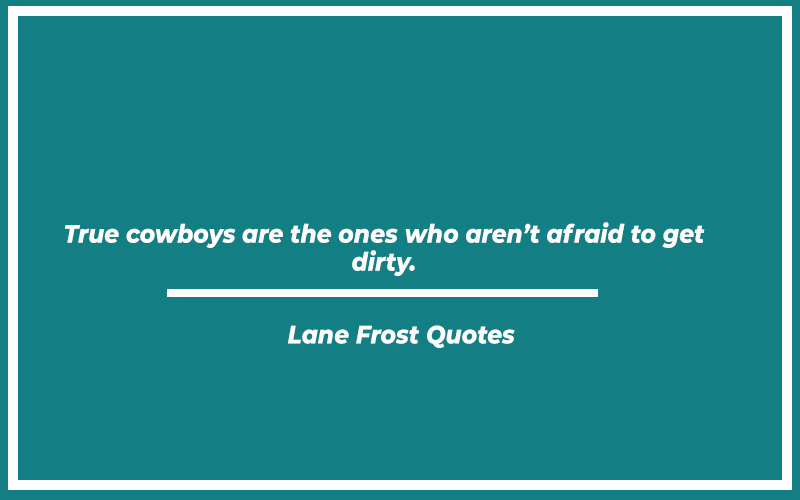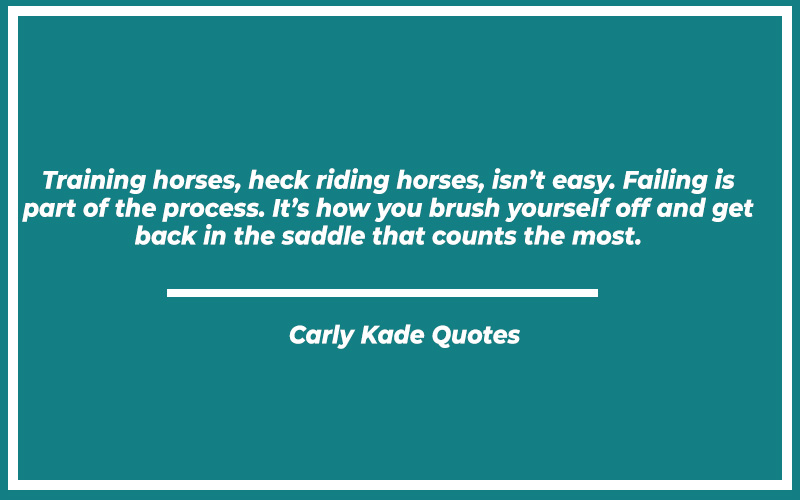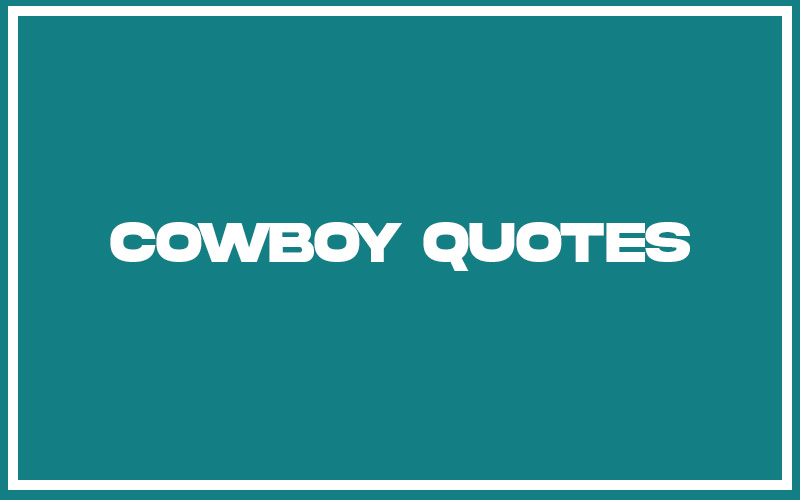Cowboy quotes, often stemming from the rich and storied genre of Western films and literature, capture the essence of a bygone era defined by rugged landscapes, lawlessness, and a relentless pursuit of freedom and justice.
These quotes are more than just words; they are a window into the soul of the Old West, reflecting the values, struggles, and character of those who lived during this iconic period in American history.
From the stoic wisdom of the lone ranger to the witty retorts of gunslingers, these phrases embody the spirit of determination, bravery, and a unique code of honor that defined the cowboy ethos. They resonate not just as remnants of a past culture but as timeless expressions of courage, resilience, and the human quest for meaning under the vast, open skies.
Cowboy Quotes

“True cowboys are the ones who aren’t afraid to get dirty.” – Lane Frost
This quote by Lane Frost epitomizes the cowboy’s resilience and hardiness. It’s not just about the physical dirt encountered in ranch life, but a metaphor for facing life’s challenges head-on. Cowboys are seen as embodiments of courage and determination, unafraid to tackle the messiness and unpredictability of life.
This rugged individualism and can-do attitude are central to the cowboy ethos, highlighting a philosophy of embracing challenges with fortitude and a readiness to endure whatever life throws their way.
Also Read: Trust No One Quotes (with Commentary)
“We have a sense that we should be like the mythical cowboy… able to take on and conquer anything and live in the world without the need for other people.” – Morrie Schwartz
Morrie Schwartz’s quote captures the cultural admiration for the cowboy as a symbol of independence and self-reliance. This idealized image suggests cowboys are capable of conquering any challenge solo.
However, it also critiques this myth, highlighting the unrealistic nature of such expectations. It implies that the stoic, lone cowboy persona might lead to isolation, suggesting a need for balance between independence and the human need for companionship and support.
“Life is a series of adjustments. I learned that from all the years I spent bronc ridin’.” – Cowboy McKennon Kelly
Kelly’s quote draws a parallel between bronc riding and life, emphasizing adaptability and resilience. Just as a cowboy must constantly adjust to stay atop a bucking bronco, individuals must adapt to life’s changes.
This analogy highlights the importance of flexibility and the ability to respond to new situations. It underscores life as an ongoing process of learning and adapting, much like the continual adjustments required in the dynamic, unpredictable environment of bronc riding.
“I have tried to live my life so that my family would love me and my friends respect me. The others can do whatever the hell they please.” – John Wayne
John Wayne’s statement is a testament to living authentically and valuing close relationships. It underscores personal integrity and prioritizes the love of family and respect of friends over public opinion.
This philosophy reflects a balance between personal principles and social bonds, suggesting a life led with honesty and loyalty. Wayne’s words imply a focus on nurturing meaningful connections, living true to oneself, and disregarding the judgments of those outside one’s inner circle.
“Cowboys work hard, play well, love soft, and are hell of a lot better than any other boy.” – Olivia Flannery
Olivia Flannery’s quote celebrates the diverse attributes of cowboys. It acknowledges their renowned work ethic and vigor, but also their capacity for tenderness and loyalty.
This quote challenges the stereotype of cowboys as merely rough and tough, revealing a depth that includes emotional sensitivity and a strong sense of affection. It portrays cowboys as well-rounded individuals, capable of balancing intense physical labor with a softer, more caring side in their personal relationships.
“Cowboys don’t get married, unless they stop being cowboys.” – David Goodman
David Goodman’s quote reflects on the perceived incompatibility between the cowboy lifestyle and marriage. It suggests that the freedom and unpredictability synonymous with cowboys clash with marital commitments.
This viewpoint romanticizes the cowboy as a free spirit, unencumbered by domestic ties. The quote implies that to embrace the conventional domestic life is to relinquish the essence of being a cowboy, highlighting the tension between wanderlust and the stability of married life.
“I have a very strict gun control policy. If there’s a gun around, I want to be in control of it.” – Clint Eastwood
Clint Eastwood’s line, reflective of his Western film roles, encapsulates the cowboy’s stance on firearms. It speaks to a mindset of responsibility, control, and self-reliance, emphasizing personal agency and competence.
This quote underlines the importance of being in charge of one’s safety and environment. It’s about the mastery and command over one’s tools, in this case, a gun, resonating with the cowboy’s ethos of independence and capability in handling every aspect of their life.
“Courage is being scared to death, but saddling up anyway.” – John Wayne
John Wayne’s words embody the essence of bravery. This quote speaks to facing fears, not in their absence, but despite their presence. It’s a universal principle applicable to any challenging situation. The imagery of saddling up despite fear mirrors life’s various challenges.
Wayne’s portrayal of courage aligns with the cowboy’s resilience, emphasizing the importance of confronting fears head-on. This philosophy advocates for facing obstacles with strength and determination, a testament to one’s character in overcoming adversity.
“I have always been willing to take the blame for the things I have done.” — Lillie Langtry
Lillie Langtry’s quote is a powerful statement on accountability and integrity. It reflects the cowboy ethic of taking responsibility for one’s actions. In a world where shifting blame is common, this stance is commendable and indicative of strong moral character.
It emphasizes the importance of owning up to actions, whether good or bad, and facing the consequences. This principle is key in maintaining personal honor and trustworthiness, essential traits in both the cowboy lifestyle and in ethical behavior more broadly.
“I want results when I fight.” – Frank James
Frank James’ quote reflects a pragmatic, results-oriented mindset. It’s emblematic of the direct and uncompromising nature often required in the Old West. This philosophy underscores the importance of clear goals and effective strategies, whether in physical confrontations or life’s broader challenges.
It speaks to the value of purposeful action and the pursuit of tangible outcomes, a mindset that’s crucial in navigating life’s difficulties. James’ statement is a call to focus on impactful actions and meaningful results, aligning with the practical, no-nonsense approach of the cowboy ethos.
“Always drink upstream from the herd.” – Will Rogers
This humorous yet insightful advice from Will Rogers serves as both practical guidance and a metaphor for independent thinking. It underscores the importance of making informed, cautious decisions, avoiding the pitfalls of mindlessly following the crowd.
The quote is a reminder to assess situations critically and act based on one’s own best judgment. It highlights the value of foresight and discretion in decision-making, a principle that’s not only vital for survival in the Old West but also in navigating the complexities of modern life.
“Life’s hard. It’s even harder when you’re stupid.” – John Wayne
John Wayne’s straightforward statement is a call to wisdom and prudence. It acknowledges life’s inherent difficulties and emphasizes how poor choices can exacerbate these challenges.
The quote serves as a reminder of the importance of thoughtful decision-making. It suggests that intelligence and forethought are key tools in navigating life’s obstacles. This message resonates with the cowboy’s ethos of self-reliance and practicality, highlighting the role of personal responsibility and smart thinking in overcoming life’s hurdles.
“You see, in this world, there’s two kinds of people, my friend – those with loaded guns, and those who dig. You dig.” – Clint Eastwood
Clint Eastwood’s character in “The Good, The Bad, and The Ugly” draws a stark line between power and subservience. This quote reflects the brutal realities of the Old West, where strength and assertiveness often dictated one’s fate.
It’s a commentary on social hierarchies and the distribution of power. The quote implies that in life, as in the West, one must either take control or be controlled. It underscores the importance of assertiveness and the ability to navigate power dynamics effectively.
“We’re in the West, the West is where you make your luck.” – Samuel L Jackson
Samuel L Jackson’s character in “The Hateful Eight” captures the spirit of the American West as a land of self-made destiny. This quote reflects the belief in creating one’s own opportunities through hard work and determination. It embodies the frontier ethos of self-reliance and the pursuit of fortune.
The statement is a reminder that fate is not predetermined but is something to be actively shaped. It champions the values of perseverance and initiative, core aspects of the cowboy spirit and the broader American narrative of opportunity.

“Training horses, heck riding horses, isn’t easy. Failing is part of the process. It’s how you brush yourself off and get back in the saddle that counts the most.” – Carly Kade
Carly Kade’s quote reflects on the inherent challenges and setbacks in horse training and riding. It parallels life’s journey, emphasizing resilience and the importance of rebounding from failure.
This perspective values the learning process over the outcome, suggesting that the true measure of character is in the recovery and persistence, not just in success. It’s a reminder that failures are opportunities for growth, vital in honing skills and building resilience, both in equestrian pursuits and life in general.
“A good cowboy knows his limits and those of his horse, and when he finds himself in a position for which, on that particular day, he isn’t qualified, he will give it up without being told or asked to do so.” – John R. Erickson
John R. Erickson’s quote captures the essence of humility and self-awareness in the cowboy ethos. It stresses the importance of recognizing one’s limitations and those of one’s companions, in this case, the horse.
This wisdom applies broadly to understanding and respecting boundaries, acknowledging when to step back, and making judicious decisions based on the situation at hand. It’s about making responsible choices, both for one’s own welfare and that of others, showcasing a critical aspect of wisdom and maturity.
“Find her, protect her, spoil her, dance with her and never stop loving her or someone else will.” – The Cowboy way
This quote encapsulates the romantic and chivalrous side of the cowboy way. It speaks to the idea of cherishing and valuing one’s partner, emphasizing the importance of continuous affection and care in a relationship.
It’s a reminder that love requires effort and dedication, and neglecting these aspects could lead to losing someone important. The quote champions the virtues of loyalty, protection, and unending love, reflecting the deep-seated values of commitment and respect in relationships.
“A Cowboy never says goodbye, it’s not in his nature.” – Kurt Philip Behm
Kurt Philip Behm’s quote highlights the cowboy’s aversion to finality and the embrace of continuous journeying. It suggests that for cowboys, life is an endless trail, where farewells are unnecessary as paths may cross again.
This perspective reflects an optimistic and open-ended view of life’s encounters and relationships. It’s a stoic acceptance that life moves in cycles and connections are never truly severed, just paused, embodying the cowboy’s transient yet impactful nature.
“When you’re gonna shoot, shoot, don’t talk.” – Eli Wallach as Tuco
This quote from Eli Wallach’s character, Tuco, in “The Good, The Bad, and The Ugly,” emphasizes the value of action over words. In the context of a gunfight, it suggests that one should focus on decisive action rather than delay through dialogue.
This advice can be extrapolated to broader life situations where efficiency and directness are more effective than procrastination or verbosity. It advocates for the power of action and the importance of seizing the moment, resonating with the cowboy’s ethos of straightforwardness and efficacy.
“You gonna do somethin’? Or are you just gonna stand there and bleed?” – Kurt Russell
This quote from the 1993 movie “Tombstone,” spoken by Kurt Russell’s character, Wyatt Earp, encapsulates the no-nonsense attitude of the classic Western hero. It reflects the quick-witted, confrontational nature of these characters, who often find themselves in situations where actions speak louder than words.
This line exemplifies the rugged, action-oriented mentality that is so integral to Westerns, where a person’s ability to stand up and face challenges head-on is highly valued.
“I have a rendezvous with destiny.” – Emilio Estevez
Emilio Estevez, as Billy the Kid in “Young Guns” (1988), delivers this poetic and foreboding line. It speaks to the fate-driven narratives common in Westerns, where characters often confront their destiny in dramatic showdowns.
This quote reflects the romanticized view of the Old West, where notions of destiny, courage, and the looming presence of death were part of the everyday reality for these legendary figures.
“You tell ’em I’m comin’… and Hell’s comin’ with me, you hear? Hell’s comin’ with me!” – Kurt Russell
Another powerful line from “Tombstone” (1993), this quote by Kurt Russell’s Wyatt Earp is a declaration of determination and revenge. It’s a classic example of the Western genre’s dramatic, larger-than-life rhetoric.
The quote captures the essence of the Western hero’s journey: a mix of personal vendetta, justice, and the unrelenting pursuit of what they believe is right.
“It’s not dyin’ I’m talkin’ about, it’s livin’.” – Sharon Stone
Sharon Stone’s character in “The Quick and the Dead” (1995) articulates a profound truth with this line. It highlights a recurring theme in Westerns, the stark contrast between mere survival and truly living.
This quote delves into the essence of life in the Old West, which was not just about the number of years lived but the depth of the experiences gained. It speaks to the relentless pursuit of personal justice and destiny, emphasizing that the true value of life lies in how it’s lived, the choices made, and the legacy left behind.
“You’re a good man, Charlie Brown.” – Don Johnson
This line from “A Boy and His Dog” (1975), delivered by Don Johnson, might not come from a traditional Western, but it encapsulates the unexpected humor and irony often found in the genre. It demonstrates the flexibility and diversity of Westerns, showing that they can seamlessly blend serious themes with lighter moments.
This quote, in its quirky nature, offers a refreshing break from the typically gritty and intense atmosphere of Westerns, reminding us that even in the most serious or dire circumstances, there’s room for humor and light-heartedness.
“Fill your hands, you son of a b****!” – John Wayne
John Wayne, in “True Grit” (1969), delivers this iconic line with the unmatched bravado and fearlessness characteristic of a Western hero. This quote exemplifies the bold and confrontational spirit of these characters, who regularly confront insurmountable odds with unwavering courage and resolve.
It reflects the ethos of the Western genre, where the measure of a person is often found in their capacity to face challenges head-on, to stand tall in the face of adversity, and to never back down, no matter the stakes.
Also Read: Wrestling Quotes (with Commentary)
Conclusion
In conclusion, cowboy quotes are not just relics of a bygone era, but timeless nuggets of wisdom and character that continue to resonate in our collective consciousness. They encapsulate the essence of the cowboy spirit – a blend of courage, simplicity, and a straightforward approach to life.
These quotes, born out of the trials, landscapes, and stories of the Old West, offer more than historical insight; they provide life lessons on bravery, justice, and resilience. Whether uttered by legendary figures or fictional characters, these phrases continue to inspire and remind us of the enduring values that once shaped the frontier and now enrich our understanding of the human experience.

